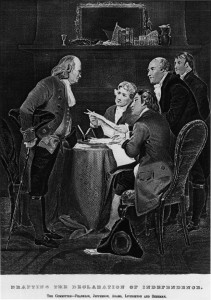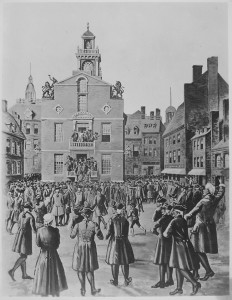© 2022 Don Pinson | [Download]
(Link not working? Right-click and select “Save As”.)
It had been a long struggle. For over twenty years the American Colonies had appealed to their king, asking him to recognize his departure from English law. The Americans, because of their Biblical foundation, understood that government servants (including the king) had to do what they did according to the law of God. King George III showed no respect for what the Bible had to say about government, and thus ignored every request to come back into the order of God.
 Finally on June 7th, 1776, Virginia delegate Richard Henry Lee introduced a resolution on the floor of the Continental Congress stating:
Finally on June 7th, 1776, Virginia delegate Richard Henry Lee introduced a resolution on the floor of the Continental Congress stating:
“RESOLVED, That these United Colonies are, and of right ought to be, free and independent States; that they are absolved from all allegiance to the British Crown; and that all political connection between them and the State of Great Britain is, and ought to be, totally dissolved.”
(The Declaration of Independence, Rod Gragg, Rutledge Hill Press, Nashville, 2005; p.35)
A committee was appointed, which included Thomas Jefferson, John Adams, and Ben Franklin, to write a Declaration of Independence which would, upon the approval of the Congress be sent to the King of England. The Congress then recessed for three weeks to give the committee time to write the Declaration.
On July 1st they reconvened to debate the newly written Declaration, which was chiefly the work of Jefferson. They also would take a straw vote to see where the different colonies stood on independence. John Adams gave a stirring speech in favor of the Declaration, ending with the words,
“Before God, I believe the hour has come. And I leave off as I began, that live or die, survive or perish, I am for the Declaration. It is my living sentiment, and by the blessing of God it shall be my dying sentiment. Independence now, and Independence forever!”
(Adams, John. July 1, 1776, Continental Congress; Daniel Webster, “Speech of John Adams”, McGuffey’s Eclectic Fifth Reader (Cincinnati and New York: Van Antwerp, Bragg & Co., revised edition, 1879; lesson LXVI, p. 199.) | Peter Marshall and David Manuel, The Light and the Glory (Old Tappan, NJ: Fleming H. Revell Company, 1977), pp. 307-308.)
The vote was then taken resulting in nine Colonies approving. While it was a majority, the delegates all knew they needed a unanimous decision. The Congress dismissed late that afternoon, due to reconvene the next day and take the official vote. Those in favor of Independence were praying and working for a miracle to change the minds of the delegates from New York, Pennsylvania, South Carolina, and Delaware. And miracles did occur!
 The South Carolina delegates were persuaded that evening of the reasonableness of the Colonies needing to be united in this effort. Pennsylvania’s delegates, Morris and Dickinson, who were against independence at this time, simply chose to stay away and not vote the next day. Pennsylvania was now in favor of the Declaration. And New York’s Legislature would instruct their delegates to vote for independence. This left only Delaware with its two present delegates split; a third, Caesar Rodney, was not present on July 1st to vote. Receiving word that he must get to Philadelphia for the final vote the next day, Rodney rode over 80 miles in torrential rains, exhausting several horses, to get to Philadelphia in time to vote on July 2nd. As he stumbled through the door of Carpenter Hall, covered in mud and beyond exhaustion, there was no exhaustion in his fiery spirit as he stated in no uncertain terms that he would cast his deciding Delaware vote—for INDEPENDENCE!!
The South Carolina delegates were persuaded that evening of the reasonableness of the Colonies needing to be united in this effort. Pennsylvania’s delegates, Morris and Dickinson, who were against independence at this time, simply chose to stay away and not vote the next day. Pennsylvania was now in favor of the Declaration. And New York’s Legislature would instruct their delegates to vote for independence. This left only Delaware with its two present delegates split; a third, Caesar Rodney, was not present on July 1st to vote. Receiving word that he must get to Philadelphia for the final vote the next day, Rodney rode over 80 miles in torrential rains, exhausting several horses, to get to Philadelphia in time to vote on July 2nd. As he stumbled through the door of Carpenter Hall, covered in mud and beyond exhaustion, there was no exhaustion in his fiery spirit as he stated in no uncertain terms that he would cast his deciding Delaware vote—for INDEPENDENCE!!
The Bible says,
“God…hath made of one blood all nations of men…” (Acts 17:24, 26)
Can there be any reasonable doubt He created this United States of America?
Think about it; because if you don’t, someone else will do your thinking for you—and for your children! And you won’t like what that brings to you. I’m Don Pinson; this has been Think About It.
